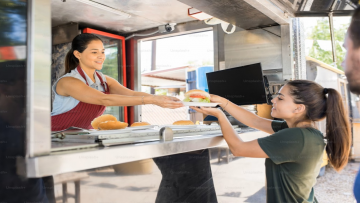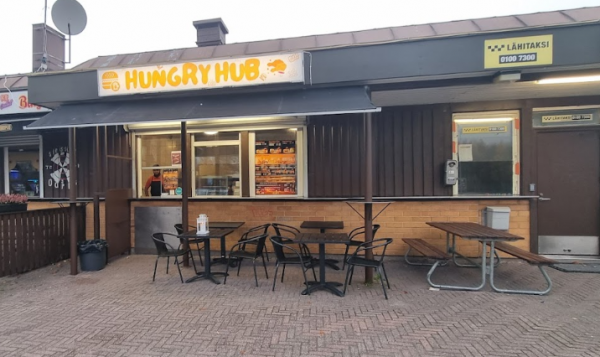Digitalization of Food Industry Franchise: Motives and Challenges of The Successful Adoption - An In-depth Exploration into Subway and Hungry Hub

Introduction
The emergence of digital technology in the food industry has become crucial to stay competitive in today’s technology-driven marketplace. The results of the MBA thesis of Javed Sikder illustrate interlinked relations among key elements including operational efficiency, customer engagement and brand consistency that facilitate adoption of digitalization. The research is based on two food franchises operating in Finland: Subway, an established global brand, and Hungry Hub, a rapidly growing regional brand. Further, this study examines the motives behind adoption and the challenges in implementing digital tools in business activities.
The Evolution of Digitalization in Franchising
Digitalization has changed the way business operates by improving efficiency, customer experience, and market acceptance. The food industry is highly dependent on advanced technology and its equipment. Therefore, the adaptation of these digital tools increases the success rate of food-related businesses. Digital tools have become more crucial for customer service and business expansion in the global competitive market. Subway and Hungry Hub, operating within the franchise business models but with distinctive market positions and approaches to the digitalization spectrum. While Subway customizes digital tools leveraging with standardization to maintain brand consistency, Hungry Hub adopts digital technology with an adaptive approach to business growth and meet local customer demands.
With the evolution of technological innovation, digital tools have become more affordable and user-friendly to operate and implement in daily business operations. Advanced technologies such as online ordering platforms, search engine optimization (SEO) and data analytics are useful tools for improving operational efficiency and customer engagement with a high retention ratio.
Why Subway and Hungry Hub
The selected case studies are Subway and Hungry Hub which represent two different franchises operating the same franchise business model with different market positions. Subway is a well-known food franchise with vast experience. A large number of shareholders around the world made Subway's appearance strong, powerful and reliable to its customers and stakeholders.

Subway with New Restaurant Design

Hungry Hub with Adaptive Restaurant Design
On the other hand, Hungry Hub is a young brand with a distinctive approach to implementing digital technologies for its food delivery and services in the Nordic countries (i.e., in Finland). They are in the initial stage of their development but are already accessing digitalization in their operation processes. Exploring these two franchises with distinctive and contrasting business approaches provided two different perspectives on the use of digitalization in the food industry.
Key Findings from the Study
Subway and Hungry Hub integrate digital tools according to their strategic goals. There were specific motives and challenges both firms dealt with during the adaptation. Subway prioritizes brand consistency and operational efficiency to ensure consistency across its franchisees around the world. Hungry Hub, on the other hand, focuses on brand growth and customer engagement to create a strong market position.
Motivations for Adoption of Digitalization
Subway’s digitalization approach is balanced for both franchisor and franchise. This includes the brand’s strategy to further global presence with consistent improvement and keep on growing according to local market demands. Besides, Subway’s digitalization efforts motivated for the smooth and flexible maintenance to uphold business core strategies and brand consistency. They implement advanced technologies including point of sales, self-service kiosks, and online ordering platforms into their operations.
Hungry Hub adopts digital tools with a view to an adaptive approach to enhance business growth, customer engagement, and specific customer demands. These tools include SEO marketing, loyalty programs and flexible ordering platforms. Hungry Hub focuses on a customer-centric approach to expand its business rapidly.
Challenges In Integrating Digitalization
Both Subway and Hungry Hub encountered similar and unique challenges as they embraced digitalization. These challenges include implementation costs, data security and privacy concerns, skill gaps in the workforce, and reluctance to change for newer technology. With the need to maintain brand consistency and improve customer engagement based on local customer demands, overcoming these challenges is becoming more difficult by the day.
Comparative Insights
The cross-case analysis sheds light on the importance of motives that drive digital transformation as well as the challenges of integrating digitalization from the perspective of both franchisors and franchisees. The comparative insights also reveal that franchise models with different strategic goals and customer engagement bring different outcomes on the digitalization approach. While Subway aims to enhance operational control and maintain standardization, Hungry Hub aims for faster growth and adopt digital solutions prioritizing local market demands.
Implications and Future Research
The exploration of the case studies provides in-depth insights into the digital transformation of the food franchise. The research reveals that companies are mainly following the concepts of service-dominant and platform-based business logic. That illustrates the essential needs of digitalization and its multi-faceted benefits to reshape customer interactions and franchise operations, paving the way for further research in the food sector.
The findings provide implications for similar businesses requiring for balancing standardization and flexibility while integrating advanced technologies. Established franchises, such as Subway, should analyze adaptation strategies more to meet unique local demands maintaining brand consistency. Alternatively, Hungry Hub type of firms should ensure that the freedom of flexibility does not harm the core strategic goal and brand identity.
This research provides with the findings of in-depth insights on the approach of digitalization in the context of food industry franchise business from different aspects including longitudinal studies for long-term analysis. A broader comparative analysis of different franchise businesses and franchise perspectives delves more deeply into the adoption of digitalization in business.
Conclusion
Digitalization has changed the strategic directions and operational activities of franchises and is reshaping the food industry. As the food industry continues to evolve, franchises need to align their strategic and operational goals to adapt to the constantly developing business world. This study demonstrates the intertwined nature of standardization and adaptability and provides valuable insights for the future.
To cope with the ever-evolving business world, further studies are motivated to focus on the successful adoption of digitalization. By analyzing the findings of current and tentative case studies, we can reveal the vibrancy of the franchise business model in a new technology-driven world to navigate the ever-dynamic food industry.
Further reading:
- Doherty, A.M. (2007). The internationalization of retailing: Factors influencing the choice of franchising as a market entry strategy, International Journal of Service Industry Management, 18(2), 184-205. https://doi.org/10.1108/09564230710737826
- Fitzgerald, M., Kruschwitz, N., Bonnet, D., & Welch, M. (2014). Embracing digital technology: A new strategic imperative. MIT Sloan Management Review, 55(2), 1–12.
- Nyadzayo, M. W., Matanda, M. J., & Ewing, M. T. (2011). Brand relationships and brand equity in franchising. Industrial Marketing Management, 40(7), 1103-1115. https://doi.org/10.1016/j.indmarman.2011.09.004
Short biography of the authors:

Javed Sikder, currently pursuing MBA degree from Novia University of Applied Science with an aim to enhance his academic and practical knowledge on digital business and management. With 6 years of experience as a Senior Merchandiser in Bangladesh's apparel industry, he brings expertise in supply chain management, product development, and client relations.

Roman Filenko holds a D.Sc. (Econ. and Bus. Admin) from University of Vaasa, Finland. His current research interests cover foreign divestment, internationalization, financial value creation and international joint venture strategies. Dr. Roman Filenko is an active member of the research community and the output of his research has been communicated to different audiences through conference presentations at the Academy of International Business, European International Business Academy, American Marketing Association and Vaasa International Business (IB) Conferences. Dr. Roman Filenko is also working as part-time lecturer and thesis supervisor at Novia University of Applied Sciences.
The blog post has been reviewed by Novia's editorial board and accepted for publication on 12.12.2024.
![]()
MBA Insights
The Novia MBA Insights blog features peer-reviewed posts authored by MBA graduates and their supervisors. Its aim is to disseminate pertinent insights and findings from MBA thesis research.
The subject matter encompasses business, leadership, digitalisation, design thinking, services, project development, and may also touch on societal issues. Posts are selected for their relevance to professionals in the field or the general public.
All blog entries undergo review by a faculty editor and subject matter experts.
We follow CC-BY if nothing else is stated.
Disclaimer: The author(s) are responsible for the facts, any possible omissions, and the accuracy of the content in the blog.The texts have undergone a review, however, the opinions expressed are those of the author and do not necessarily reflect the views of Novia University of Applied Sciences.
Posta din kommentar
Kommentarer
Inga har kommenterat på denna sida ännu